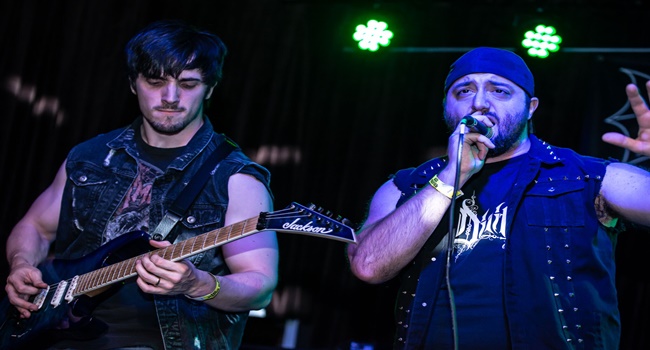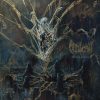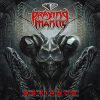Eternal Ascent – Passion and Affinity
Thursday, 7th April 2022
Born out of a love for power and symphonic metal, Eternal Ascent is the work of Mark Bellofatto (vocals, keyboards, drums) and Chris Rush (guitars), fleshed out with bass work from Nick Crimarco and numerous guest appearances from musicians far and wide. Their debut album Reclamation brings a host of influences domestic and overseas to the table – proving these New York musicians have a wide array of ideas that they execute in a professional manner from first track to last. We were able to catch up with Mark and Chris on Zoom who brought us up to speed on the formation of this new act, guest appearance choices, video work, challenges competing against all the other product on the market today, and whether they will bring this project to the stage down the line.
Dead Rhetoric: Tell us about the origins of Eternal Ascent – how did the two of you decide to come together, and did you know straight away the elements you wanted to develop in your brand of symphonic power metal style, or was it a feeling out process to achieve what you wanted with those first songs?
Mark Bellofatto: I think it started – we met in Sacred Ash, which you probably had seen us when we opened for Seven Spires. We had a brand of material that wasn’t fitting the band. We were looking for a home for this content that we were pumping out. We had this strong affinity for power metal, but we didn’t have an outlet for it, so this gave birth to this project out of necessity. “March to the Light” for instance was a song proposed to Sacred Ash, and ultimately turned down because it didn’t fit the style. We always felt strongly that it needed to be released, so it gave birth to the direction of the album.
Dead Rhetoric: You also ran a crowdfunding campaign to support the record. How do you think this experience went, did you enjoy the process?
Chris Rush: As a guy who in college when you work with a bunch of video majors, everyone tries to get their film Kickstarted, going to their friends and family to support. I had seen so many of these campaigns, both succeed and fail, so it was a scary process to be honest. I learned from a lot of watching other people do it, other bands do it for a long time before we launched it. We took a long time trying to figure out what the best things were that actually make people who have only heard two songs – that’s all we had out when we launched the campaign – we needed to make sure we put forward two songs that enveloped more or less everything that we would have on the album. We needed to show a little bit of the heavier side, the speed and symphonic elements, but also the catchiness. There is a little bit of each that are on the album. We put at the time two of our best songs we had – and tried to make sure the rewards were enticing for people who have listened to us, and who haven’t. Put as much in the back end as possible before it launched.
It was really nerve wracking until two weeks in when we hit the mark. After that, it was great.
Dead Rhetoric: Reclamation is the debut album for the band. What can you tell us regarding the recording sessions and songwriting? Were there any surprises, obstacles, or delays to overcome, and how do you feel about the final product now that it’s out?
Bellofatto: To address the process question, I will preface this answer with a disclaimer. One of the beauties of self-producing your album is, that you are beholden to nobody when you are picking your direction, right? I think we had the luxury but also the obstacle of being unrestricted. With the world as our oyster, I think it really drove the direction-less direction of the album, if that makes any sense. It’s like when you open with the track “March into the Light” and then jump into this straightforward power metal song with “Blight of Dragons”, it starts to get heavier and lighter. The flow of the album is something that I as a listener really enjoy. It keeps you on your toes, it’s not the same track after track.
That said, I think a lot of songs were left on the cutting room floor. We had stuff that we wanted to put in, we couldn’t find the fit.
Rush: We had some songs that when album number two comes along they will be resurfacing, I think. It was crazy, in the last two months of our production, very abruptly we decided we’ve grown, we have two new songs, let’s try to detach ourselves from these songs that we wrote from the very beginning and let’s swap them out for material that is much more identity defining to us. Which was “Blight of Dragons” and “Reclamation”. Once we got to the 50 % mark, we looked at what we needed to break ties with. But we think this is a really rewarding album, and we hope for the listeners they have that same feeling.
Dead Rhetoric: Can you tell us how you arrived at some of the special guests that appear on the record, including guest spots from members associated with Twilight Force, Mors Principium Est, and local musicians like Dialith among others?
Bellofatto: I think a lot of what drove that is, who do we admire as musicians. It was like two kids living a fantasy, like who is the most ridiculous person that we can reach out to and get on this album? Obviously, we’ve been friends with Dialith since Sacred Ash, I love Krista and Alasdair, I love their writing styles and performing styles. To me that was a no-brainer. Andy Gillon is a guitarist that both Chris and I love as a musician and composer. We reached out to him on Facebook, he responded, and it was real. My personal favorite track on the album, and I say this very hesitantly, it depends on the mood I am in, but “Blight of Dragons” with Kristin and Blackwald from Twilight Force. Kristin and I started chatting about our mutual love for Tommy Karevik, who is the current singer of Kamelot, on a Facebook page. After becoming friends, I told her about this album we were collaborating on and asked if she would want to sing on it. She said hell yes, and it was funny, because Blackwald wasn’t supposed to be on the album, he just kind of appeared. We got a track, I was like ‘what is this?’, and it was him! This is great, let’s put this in. That was a mind-blowing experience, getting to work with people of that caliber, as amateurs.
Dead Rhetoric: What can you tell us about the videos that have been released to date for the record? Can you discuss the importance of the visual medium in these social media driven times to establishing the credibility and brand of the band – especially being a DIY, independent act as you are?
Rush: Do it yourself is our motto. We do as much as we can on the production end ourselves. Especially for the videos, we direct and shoot ourselves with some friends I have met in college. Shout out to Charlie (DesJardin), he’s a great friend who knows exactly what I want when I am directing these videos. For the very first time in my career, we shot an actual story music video. It’s much harder than shooting just a playthrough. We did that for “The Lie”, and we launched that for the Kickstarter. We knew that a thumbnail with a video would be important to grab people for the campaign. The video medium is everything I do; music is the hobby for me – but to bring those two together is extraordinarily enjoyable. We are still experimenting every few weeks with social media, trying to figure out new ways to target people, find people that will receive it the best. Without argument, this is one of the best ways to reach your fans. It doesn’t have to be a million-dollar budget, it can be literally zero which is almost everything we have done. Get your camera, get your lights, go out there and shoot a video.
Dead Rhetoric: What do you consider some of the biggest challenges Eternal Ascent faces in establishing yourselves and your footprint in the scene?
Bellofatto: That’s a complicated question. In my own ignorance, we went into this blind. We didn’t have a guide to follow, we didn’t have a promotion agency, we didn’t have management. We started with what we had, the passion for the music. Let’s write something – it’s the same way we’ve approached things in Sacred Ash, Lyra, whatever – we start with what we want to listen to, because at the end of the day we are going to probably be the ones who listen to it. When we started to build this confidence, that confidence grew with seeing an audience for this.
Dead Rhetoric: As a newer band, has it been tough to compete against thousands of other bands, not just independent ones but also ones on labels with major backing?
Bellofatto: Market share is always a huge concern, right? With the advent of the internet, which is our best tool, it’s also our worst enemy. Anybody with recording software can literally put out an album. How do you break through that barrier of a wall of noise? Every Friday, there are 15-20 albums being released. I think that is a challenge. We have to take a holistic approach – we make a product that we want to listen to, and it’s a game of social media marketing trying to target your advertising, it’s the whole business end of the deal. I’d like to think that our professional lives sort of aid in that, in being able to recognize this is what is trending, this is how you break in. But there is a long way to go, you need to keep that exposure going, you need to keep doing these kinds of things. We need to talk to people and get the word out to as many people as possible. We just hope and pray that the people who love our music will share it with more people.
Dead Rhetoric: How do you view the state of symphonic metal and power metal worldwide currently? What excites you about the scenes, and what changes (if any) would you like to see implemented for the better of all parties involved?
Bellofatto: I think that music as an artform, not just symphonic or power metal, people need to remember it’s an artform. It’s a very subjective medium, the music that people put out means a lot to them. Through the over commercialization of metal in general – at the end of the day, people who want to go make a career of this, you find a formula, plug yourself in, and it creates this homogeneity within music where everything sounds the same. I love when I hear bands that say, ‘fuck this’, I want to play what I to play. When you see it live, they have this sound you have not heard before, there’s no better feeling as a listener. I try to pick and choose where my hooks go, while maintaining my artistic integrity.
Rush: Something we didn’t realize until we started talking to people like yourself and saw people talking about the album. Correct me if I’m wrong Mark, but we didn’t set out to be symphonic power metal when we started this. It was cool to have strings, I didn’t want to touch horns, or any brass for a year or two. The title track happened with Mark; it was really fun. All of a sudden, the album comes out, people were saying this was symphonic power metal, and they weren’t wrong. Seeing labels where they are appropriately placed. When you take a step back and see the music really evolved with me having a very thrash metal background, going all the way to what we have in Reclamation. It was awesome, and weird at the same time.
Dead Rhetoric: Are there plans to take Eternal Ascent to the stage, or will this remain strictly a studio-driven project? What are your views on the differences between the studio and the stage when it comes to being a musician and fulfilling your desires and passions?
Rush: The grand question. Mark and I, I think the longer we have been doing this project the more freaked out about how similar we are not just in musical tastes but how we approach everything from behind the scenes to getting up on the stage. We really want to do this live, – but we did this to ourselves. We put ourselves in charge to what we wanted to create is a similar vision to create music that we both clearly listen to and enjoy, but we need to fill in the gaps. Mark can play drums, Mark can play keyboards, Mark can sing – and while it would be entertaining to watch him do all three at once on stage, it’s not possible. I can play guitar, and can do backup vocals, but you don’t want to hear my backup vocals. We need to flesh it out and find people in New York state that want to play power metal- which is a bit of a niche pool.
We are definitely very interested in looking into it. Also, there is the impact that shows aren’t really still being booked for filling up a room. We really do miss this. There isn’t anything else like being up on a stage. It’s very different than pressing record and redoing the takes a million times. It’s a nervous but amazing adrenaline rush, and we want to perform live.
Bellofatto: As a front man, there’s no greater fear and validation than performing to people who want to hear what you are performing, right? The thrill of getting on the stage, the fear beforehand, the relief afterward, it’s something that I do really miss. The goal is, not just to find musicians but to find the right musicians who share a vision with us, who want to embrace the passion the way that we have.
Dead Rhetoric: What concerns you most about the world that we live in today? Where do you think the average person needs to put more attention and focus on to make the world a better place overall?
Bellofatto: When you look at the lyrics throughout the album, I think the time in which we wrote the album, like many bands who were stuck at home doing nothing, it gave a lot of us time for reflection. If people could take more time to look inwards, evaluate their own values and beliefs, versus comparing themselves to what people expect them to be through social media or mass media. People can spend more time being introspective, they may realize what’s really important in their lives. To make the world a better place, to say something like that is a very subjective thing, right? I would love for people to just respect everybody’s independent and individual life paths. We are all on our own paths. But some people just can’t be that, right? They were raised to believe differently. We need to respect that as well. It’s a very complicated world that we live in.
Dead Rhetoric: What do you consider three of the most important albums that shaped your outlook and viewpoints on heavy metal? And what’s the best concert experience that you’ve taken in (metal or otherwise) purely from a member in the audience perspective – and what made that stand out the most to you?
Bellofatto: It’s not necessarily an album, but musically my biggest influence was Mozart’s “Requiem”. Because it is a very powerful piece. When I first heard “Requiem”, I was at a turning point in my life, entering high school. I never heard metal bands before, I grew up listening to 80’s rock. I would have to put – and this will be a weird one – Wintersun’s first self-titled album. It was another sort of revolutionary experience for me, it opened me up to music I had never experienced. I would say Ecliptica from Sonata Arctica. That was the first metal album I listened to, period. You think a lot of people would say Metallica, Megadeth. Nope- this is great.
In terms of musical performance being a member of the audience. I was entranced watching Nightwish live, the first time Sonata Arctica and Nightwish at the Worcester Palladium. It was a while ago – the theatrical nature of Nightwish’s performance, it took my breath away. This is what I want in my life.
Rush: I’ll start with probably Lamb of God – Wrath. That’s one of the best, it’s about riffs for me. If you play a chord, you have to put something fancy in there, you can’t hold your hands down. I may play four chord progressions, but it’s heavily influenced by Lamb of God and their riffs. They can take a verse and make it into a chorus, and that’s impressive as a whole. Mark Morton is a riff god. In terms of what I looked to, shaping my influence on this album are two records. One is Awakening by Wardrum – I love the fact that Kosta Vreto, who did a guest solo on our album, I was in Italy and on vacation, I thought he would be cool to have on a song. He said yes, laid down a cool solo. He took a thrash element and puts it into power metal. It’s heavy, powerful, and beautiful all at the same time. Side by side, it was Unleash the Archers – Apex. Apex was really cool. I wasn’t really a fan of (theirs) until that album. Something went from zero to a hundred for me. They have kept it going for Abyss. They have this resurrection about what is perfect about heavy metal in the 80’s and 90’s – raised it up to eleven.
As for live shows, I have to say seeing the Eagles when I was a kid, blew my mind. You hear rock bands from way back when on an album, but all of a sudden you hear them in Madison Square Garden, and you hear how loud and impactful they are. It was awesome for me, and great to see Joe Walsh shred on guitar for twenty minutes with a camera on his head walking around. It helped me take guitar seriously.
Dead Rhetoric: What’s on the horizon for activities over the next twelve months for Eternal Ascent? Are there other projects, recordings, guest appearances that we can expect from either of you also down the line?
Bellofatto: Our two primary goals are, continue to promote Reclamation. We put a lot of time into this album, we want to milk it for all its worth. I’m talking from a passion perspective, let’s get this out there. A big goal for me is finding musicians – I want to see this album brought to the stage. In terms of guest performances – anyone wants to hit me up, I’ll sing on anything. I like to do this for fun.
Rush: I do appearances with a few bands – one person reached out asking for a guest appearance, but since my wife had our first baby, I haven’t been able to pick up a guitar seriously in about two months. Like Mark said, we want to get this on a stage when we can find the time to do it. When the time is right, we will lay down more tracks. We released an album, we may release a single here and there, there is special stuff in the hidden folder.
Bellofatto: A lot of what would drive a second album is, would people want it? We love the recording process, but I love when people love it more than me.






















